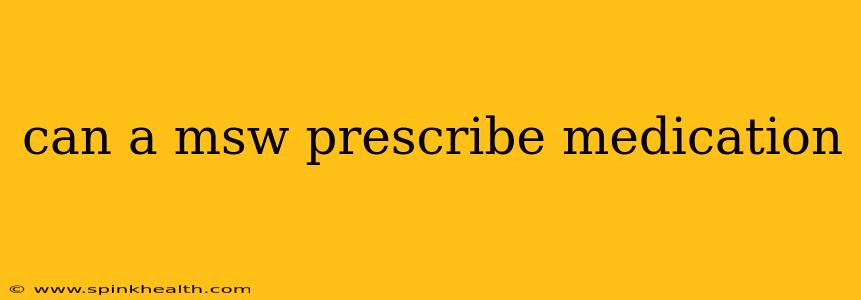Can a MSW Prescribe Medication? The Short Answer: No.
Let's dive into the world of mental health professionals and explore the roles of different practitioners. It's a common question, and one that deserves a clear and comprehensive answer. The simple answer is no, a Master of Social Work (MSW) cannot prescribe medication. But that doesn't diminish the incredibly important role they play in mental health care.
Imagine Sarah, a young woman struggling with anxiety. She seeks help and finds herself in the office of a compassionate MSW. Sarah's MSW, let's call her Emily, listens intently, asks insightful questions, and helps Sarah understand the root causes of her anxiety. Emily might use various therapeutic techniques, like Cognitive Behavioral Therapy (CBT) or Dialectical Behavior Therapy (DBT), to help Sarah manage her symptoms and develop coping mechanisms. But Emily cannot prescribe medication.
This is because prescribing medication requires specific medical training and licensing. That's the domain of medical doctors (MDs) and, in many areas, physician assistants (PAs) and nurse practitioners (NPs) who have received specialized training in psychiatry or related fields.
What Can an MSW Do? A Crucial Role in Mental Healthcare
So, what can an MSW do? The truth is, MSWs play a vital and often overlooked role in mental health. They offer:
- Therapy and Counseling: MSWs are trained therapists who provide individual, group, family, and couples therapy. They help individuals understand their emotions, behaviors, and relationships, guiding them toward healthier patterns of thinking and behaving. This is a critical component of mental healthcare.
- Case Management: They coordinate care for individuals with complex needs, connecting them with resources like housing, healthcare, and support groups. They act as advocates for their clients, navigating the often-complex systems of social services.
- Assessment and Diagnosis: While they don't diagnose medical conditions, MSWs conduct thorough psychosocial assessments to understand the client's circumstances, mental health history, and support systems. This information is vital for building an effective treatment plan, often in collaboration with other healthcare professionals.
- Advocacy and Policy: Some MSWs work on a larger scale, advocating for policy changes that improve mental health access and support within communities.
Who Can Prescribe Medication for Mental Health?
The professionals who can prescribe medication for mental health conditions include:
- Psychiatrists (MD or DO): Psychiatrists are medical doctors specializing in mental health. They can diagnose and treat mental illnesses using both medication and therapy.
- Psychologists (PhD or PsyD): While not typically able to prescribe medication, psychologists provide therapy and conduct psychological assessments. In some states, psychologists with additional training may be allowed to prescribe medication.
- Psychiatric Nurse Practitioners (PMHNP): These are registered nurses who have advanced training in psychiatry. They can diagnose, treat, and manage mental health conditions using medication.
- Physician Assistants (PA) specializing in psychiatry: Similar to PMHNPs, these PAs work under the supervision of a physician, and in many instances, can prescribe medications for mental health conditions.
Frequently Asked Questions (PAAs)
Can a social worker recommend medication? While an MSW can't prescribe medication, they can absolutely recommend that a client seek evaluation from a psychiatrist or other medical professional who can prescribe. They often play a key role in coordinating care with other professionals.
Do social workers work with psychiatrists? Yes! Collaborative care is common in mental healthcare. MSWs and psychiatrists often work together, with the MSW providing therapy and case management while the psychiatrist manages medication.
What is the difference between a social worker and a psychiatrist? The key difference lies in their training and scope of practice. MSWs are trained in social work principles and therapy, while psychiatrists are medical doctors specializing in mental illness and medication management.
In conclusion, while an MSW cannot prescribe medication, they are a vital part of the mental healthcare team, providing essential support, therapy, and advocacy. Their role is crucial in helping individuals navigate their mental health journeys, often working in close collaboration with medical professionals who can prescribe medication when needed.

